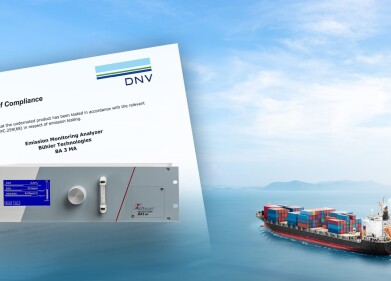Measurement and testing
Innovative thermowell improves reliability in oil and gas pipelines
Sep 22 2010
A manufacturer of temperature measurement products has launched a unique design of thermowell that can easily and safely be installed in process pipelines if a standard thermowell has failed the ASME Performance Test Code (PTC 19.3, 2004).
ASME PTC 19.3 is not a design standard and should only be used by thermowell manufacturers to prove that their designs are suitable for the process conditions. Up to now, if a thermowell failed this test code, the manufacturer was left with several options: to shorten the thermowell immersion or to increase the diameter of the thermowell, neither of which are often very practical or cost effective for the end user.
Another option used by most thermowell suppliers is to incorporate a velocity collar in order to move the point of vibration or resonance. But adding a velocity collar means the thermowell needs to be manufactured to a very high tolerance (on the collar OD) and that the corresponding nozzle is similarly machined to suit. This ensures a tight fit so that no resonance can occur. While this seems to work, the extra costs incurred by the thermowell manufacturer are usually passed on to the buyer.
However, an alternative solution is now available. After extensive R&D and independent evaluation, Okazaki Manufacturing Company (OMC) has developed a unique design of thermowell, the VortexWell®, which doesn’t require a velocity collar and is cost effective for the end user in terms of purchase, installation and maintenance costs (whole lifecycle costs).
OMC’s VortexWell® incorporates an innovative helical strake design, very similar to the helical strakes seen on car aerials and cooling towers. Chris Chant, Business Development Manager at OMC (UK) comments: “By using the latest CFD [computational fluid dynamics] software to visualise the flow behaviour, we were able to accurately compare a standard tapered thermowell and our new VortexWell® design, which incorporates a helical strake. What we discovered was pretty dramatic.”
In the analyses, the standard tapered thermowell showed classic shedding behaviour as expected, whereas the VortexWell® demonstrated no signs of regular flow behaviour. The VortexWell® helical strake design disturbed the flow sufficiently to interrupt the regular formation of vortices. Whilst a small vortex was observed in the wake of the VortexWell® this was a localised stagnation point and didn’t shed.
However, the most significant comparison made was with regard to the pressure fields. “For the standard tapered well design, an oscillating pressure field was observed around the structure. The VortexWell® displayed a constant and stable pressure field, presenting no dynamic variations. As this pressure is the source of vortex-induced vibrations, it can be assumed that the VortexWell® would experience a significant improvement in practise compared to the standard thermowell design,” adds Chant.
In further tests, this time using FEA, OMC found that the ASME calculations used by thermowell manufacturers could be placing significant limitations on the safety of petrochemical applications. Using the ASME calculations gave the lowest natural frequency of vibration for the standard tapered thermowell to be 68.5Hz. However, OMC’s own FEA results showed a corresponding value of 90.3Hz, a difference of more than 30%. This highlights that the ASME calculations design rules include assumptions that can do lead to considerable inaccuracies when designing thermowells for petrochemical applications. The risk of a thermowell failing due to under-engineering, or the extra costs incurred by the end user because of an over-engineered thermowell, can both be avoided if the buyer works with a reputable, experienced thermowell supplier such as OMC.
Tel: 02920 814 333
info@okazaki-mfg.co.uk
www.okazaki-mfg.co.uk
Digital Edition
PIN 26.1 Feb/Mar 2025
March 2025
Analytical Instrumentation - Elemental Analysis for Quality and Process Control at Refineries, for Lubricants and Wear Metals in Engine Oils - Synthetic Lubricants: New Developments - Scaling...
View all digital editions
Events
Apr 08 2025 Birmingham, UK
Apr 08 2025 Kielce, Poland
Apr 08 2025 Ravenna, Italy
Apr 08 2025 Southampton, UK
Apr 08 2025 London, UK
























